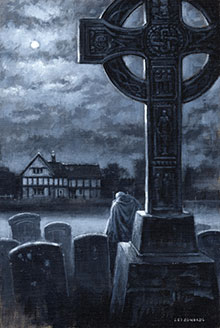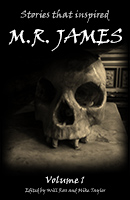 In this episode Mike & Will don their funeral garb and shuffle mournfully into ‘There was a man dwelt by a churchyard‘ by M.R. James.
In this episode Mike & Will don their funeral garb and shuffle mournfully into ‘There was a man dwelt by a churchyard‘ by M.R. James.
A big thanks to Robert Lloyd Parry for giving us permission to use readings extracted from his excellent CD ‘Curious Creatures: The Shorter Horror of M.R. James‘, available to purchase from his website nunkie.co.uk!
An equally big thanks go to Les Edwards for giving us permission to use his gorgeous artwork inspired by this very story, just one of the many illustrations Les did for the recent M.R. James collection ‘Curious Warnings: The Great Ghost Stories of M.R. James‘. »
You can buy a print of this painting as well as many others from his website lesedwards.com
Show notes:
- A Winter’s Tale by William Shakespeare (wikipedia)
This title of this story comes from a line spoken by young Mamillius in Act 1 Scene 2 of Shakespeare’s ‘A Winter’s Tale’. Our audio extract came from the BBC’s lovely Shakespeare Animated Tales version of the play, available to watch on YouTube. - Brass rubbings at Oddington, Oxfordshire (White Winds Brass Rubbing)
In this episode M.R. James refers to an ‘old brass in a church with a figure of a person in a shroud’. While it may not be the exact brass James was thinking of, the shrouded figure at Oddington Church is certainly of a similar kind to the one he refers to. - Ghosts & Scholars story notes (Ghosts & Scholars)
Rosemary Pardoe’s notes on this story throw some very helpful light on some of the more perplexing parts of this story. - John Poole, playwright (wikipedia)
We forgot to mention it in the episode, but it is likely that M.R. Jame’s choise of the name ‘John Poole’ is a nod towards the English playwright John Poole (1786–1872) who was famous for this Shakespeare parodies. - “‘I seen it wive at me out of the winder’: The Window as Threshold in M.R. James’s Stories” by Rosemary Pardoe (Ghosts & Scholars Newsletter 4)
This is the essay Will mentions in this episode which explores how James uses the window as a reoccuring feature of this ghost stories. Sadly the essay is not available to read online. - Will-o-the-wisp or corpse lights (wikipedia)
In this story the smith asks John Poole if he has ever seen any ‘lights’ in the churchyard. Rosemary Pardoe suggests that this is a reference to ‘corpse lights’. - Ghosts & Scholars Survey (G&S)
This story has an unenviable reputation for being voted one of the least popular M.R. James stories with readers of Ghosts & Scholars!
Podcast: Play in new window | Download
Subscribe: RSS
Tags: A Winter's Tale, churchyard, Curious Creatures, Curious Warnings, Ghosts, hauntings, John Poole, Les Edwards, M.R. James, mamillius, Montague Rhodes James, Robert LLoyd Parry, Shakespeare, There was a man dwelt by a churchyard








An interesting discussion, of a story which I’ve always liked. Is it possible that the woman left money to the church to pay for masses, hoping to avoid damnation? If she had a bad reputation, this would explain why the church buried her money with her, regarding it as tainted. I’m not clear why she came to get it back, though: wherever she ended up, what could she spend it on?
Great conjecture, Richard! As to why she returned, I would imagine that her intention might be to retrieve the money and go a-haunting at some other church until she found a vicar who would take the money and say masses for her. Following the logic of the story, it was probably those prayers that would be her best defense against meeting the Devil. And since the church failed to keep its bargain and the old miser stole from her to boot, she was probably desperate to avoid her appointment with Old Nick.
I’ve always thought this story deserved a better reputation than it had; its simple and succinct and it’s “Jamesian wallop” was very meta. Regarding the purse of money, I’d always assumed that Mother Wilkins had left the extra purse of money to the Church (and paid well for the bearers) to ensure that she would be buried in holy ground with the bag of money that was thrown into her grave. Those coins would be used to bribe the devil or protect her soul or something like that. Somewhat like Dr. Rant being buried sitting upright in the Tractate Middoth. That’s why she’s so possessive of it and returns from the dead to get it. I never even thought that the church would reject her payment; its insights like that that keep me listening and enjoying the podcast. Also, I’ve downloaded and listened to Robert Lloyd Parry’s reading of this story (and the others on the CD) and can highly recommend them!
This was really enjoyable! You presented it well, in the proper context: A fine storyteller, in good voice, putting in some drama and milking the climax! It takes me back to stories told at summer camp, morality fables that end badly for those who stray from the straight.
I agree with the previous posting. The old woman, her simony rejected, comes back to claim her money. Why? Maybe she intended a second attempt to buy salvation. Maybe she was just avaricious.
I wonder if Ray Bradbury ever read M R James? The dry earth rattling on the floor reminds me of Bradbury’s The Emissary where a boy’s dog goes digging where he shouldn’t dig and brings an unwelcome guest back.
I wonder if James ever read Twain. His ‘Golden Arm’ is similar to this story, complete with the ‘Gotcha!’ at the end. But he might have heard it elsewhere; Twain says he was told the story as a boy by by a slave on his uncle’s farm.
As for Shakespearean references, Haynes’s prayers in ‘Barchester’ remind me of Claudius’s in ‘Hamlet’. Both men ask for divine help without any intention of giving up their ill-gotten gains.
Delightful! Going to have to get me one o them story CEEdees.
It makes my head hurt a little that Mamillius would set his tale in the time of Pirate Queen Bess, given that Winter’s Tale is set very rigorously in “the olden days; you know, way back when.”
[Edited for fat-thumb type errors]
Delightful! Going to have to get me one o them story CEEdees.
It makes my head hurt a little that Mamillius would set his tale in the time of Pirate Queen Bess, given that Winter’s Tale is set very rigorously in “the olden days; you know, way back when.”
you both turned one his least regarded stories and made it signifficant with the references but your evaluation was just damn entertaining. It’s hard to replicate your kind of teamwork and timing. Just as it’s quite impossible to find art that stuns me more than than Les Edwards
I’ve always thought this story very slight but I have warmed to it after successive readings. Surely John Poole’s fate at the hands of the ghost is simply a punishment for his crime? After all, evil is always punished in some way in MRJ’s stories; and this one is no exception. The witch is punished as presumably her attempt to bribe her way into the Church’s good books has not worked; and John Poole is punished by the witch herself. And they all lived happily (?) ever after…
Regarding the shroud with the top knot, this was indeed the practice at one time. John Donne’s effigy in St. Paul’s represents him in such a shroud, and he was also illustrated in it several weeks before his death, which must have made for a cheery couple of sittings.
http://www.todayinliterature.com/assets/photos/d/donne-effigy-204×245.jpg
http://pietistschoolman.files.wordpress.com/2011/09/john-donne-enshrouded.png
James Barrett beat me to it! My first thought on reading this story was “It’s a variation on The Golden Arm!” Actually, I suppose both are versions of a common ancestral ghost-story-with-a-gotcha. Both versions emphasize trying to get someone listening to squeak with the final pounce. From M.R. James’ telling I gather he was well aware that the story had gone the rounds in a variety of forms.
Twain’s take is linked below. I think it’s even shorter than M.R. James’ version, and has crazy spelling that gives James’ yokels a run for their money:
http://www.gutenberg.org/ebooks/3250
As to what the ghost wants or wanted, this can probably be regarded as a bit of Jamesian inconsistency — he does sometimes let the logical sense of a story fall away in order to get a more effective atmosphere — but I’d argue that it can be consistent on its own terms too.
The donation of money to the church is symbolic as well as practical: to the old woman, it’s just as satisfactory to have it in her grave as to have it spent on masses, even if the parson feels differently. (We don’t after all hear of anything untoward going on between the burial and Poole’s theft… though, to be fair, he doesn’t leave much time!) The important thing is that the money not be used for secular purposes.
I’ll admit I’m stretching a bit here, but I think it can just about hold together.
Exhumations in the UK are generally carried out at night or dawn to prevent the gathering of gawpers, to prevent distress to those visiting the church or cemetery, and to ensure that the body’s reburied by the time the cemetery’s open to visitors.
In ye oldene dayes, dawn was much preferred, though evenings tend to be preferred today because the portable light rigs provide really good light, which means people can have a late night and not get up too early.
We had an exhumation carried out when a family member was buried in the wrong plot. The coffin had to be opened, the body identified, and then reburial in the correct plot a few yards away. It all happened at about 10pm.
I’m not at all sure why this story is so unpopular, although, given its brevity, perhaps “piece” might be a more apt word. Obviously it is a matter of personal taste but in the unpopularity stakes in my view “Two Doctors” and “The Story Of An Appearance and a Disappearance” are far worse than this little offering.
In his travels Monty would undoubtedly have come across instances of what are called “shroud” brasses. To our eyes they are somewhat morbid, commissioned (often in the lifetime of the person commemorated) to remind them of their mortality. Many survive and of these there is an especially fine one at Yoxford in Suffolk which Monty may well have seen.
The one to which you refer, at Oddington, and which I have rubbed, is especially gruesome with worms devouring the corpse. It was a favourite of T.E. Lawrence, Lawrence of Arabia, another brass rubber, who kept his rubbing of the brass on the wall of his room in Jesus’ College.
I agree with another reviewer, in that one bad turn deserves payment in kind. So, the theft of the money left by the deceased to buy her way to Heaven – the money presumably to be expended in good works (as by this time Masses for the Dead were a thing of the past) proving to be the way by which the thief meets his nemesis.
In my view, an enjoyable little tale with a good “punch” at the end.
I’ve only recently discovered this podcast, but have already tremendously enjoyed several episodes. “There was a man…” is a story that I sometimes tell to my students (11 year olds). Simple, but effective. They enjoy a good scare.